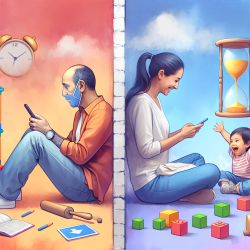Introduction
In the digital age, the prevalence of screen media in family environments has raised concerns about its impact on child development. Recent research, "Do parent media habits contribute to child global development?" highlights the significant role parental screen time plays in shaping children's developmental outcomes. This blog explores how practitioners can leverage these findings to enhance their skills and encourage further research in this domain.
Research Findings
The study followed 315 preschoolers and their parents during the COVID-19 pandemic, focusing on the correlation between parental screen use and child global development. Results indicated that each additional hour of parental screen time was associated with a decrease in child development scores. This suggests that parental screen habits are a critical component of a child's media ecology, potentially impacting communication, cognitive, personal-social, and motor skills.
Implications for Practitioners
Practitioners working with children and families can use these findings to inform interventions aimed at reducing screen time and promoting healthier media habits. Here are some actionable steps:
- Encourage parents to be mindful of their screen time, particularly during interactions with their children.
- Promote activities that foster parent-child engagement, such as reading, playing, and physical activities, which are crucial for child development.
- Educate parents on the potential negative impacts of excessive screen time on child development, using data-driven insights from the study.
Encouraging Further Research
The study opens avenues for further research into the nuances of parental screen use and its long-term effects on child development. Researchers are encouraged to explore:
- The differential impacts of various types of screen activities (e.g., texting vs. educational content) on child outcomes.
- The role of parental mental health and relationship quality in moderating the effects of screen time on children.
- Strategies for effectively integrating screen time management into parenting programs.
Conclusion
Understanding the impact of parental screen habits on child development is crucial for fostering optimal developmental outcomes. Practitioners are encouraged to integrate these insights into their practice and support parents in creating a balanced media environment for their children. For those interested in delving deeper into the research, the original study provides comprehensive data and analysis.
To read the original research paper, please follow this link: Do parent media habits contribute to child global development?










